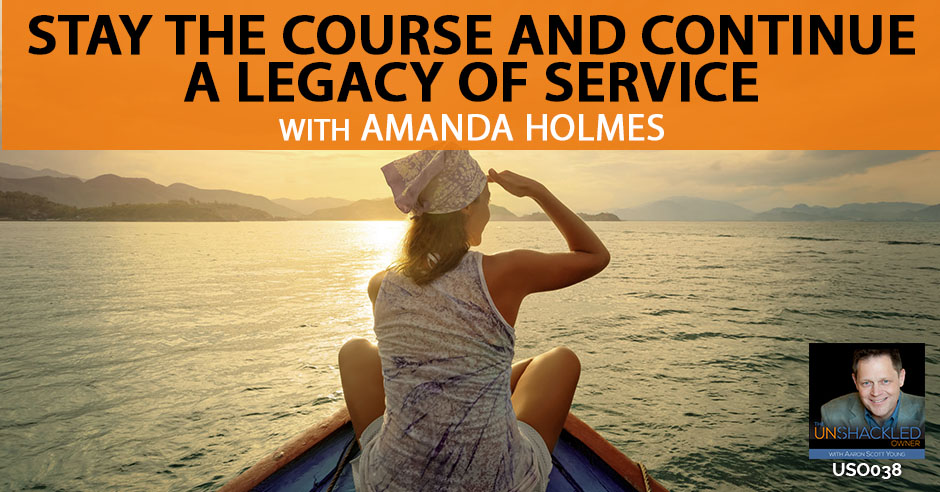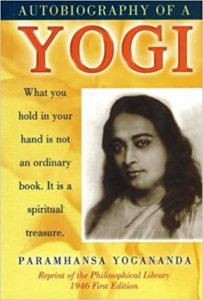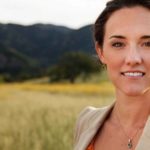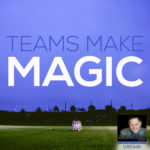
Stepping up and into the footsteps of your father is one of the biggest challenges for a young entrepreneur, especially if their father is a business icon. Amanda Holmes, CEO of Chet Holmes International, decided to step into her destiny and chose to stay the course of continuing a legacy of service. Her father instilled in her the importance of following her dreams and putting family first. She was a reluctant entrepreneur until she heard the clients and really listened with her heart. Through soul-searching and meditation, she learned to serve people the same way her father did. Amanda shares how following her heart played a big part in doubling the sales of her company ever since she took over.
—
I’ve just returned from the City Summit. It’s a company city gala fundraiser up in Hollywood, California. At the City Summit, we had some of the most phenomenal people I’ve ever met in my life both speaking on the stage and in the audience. One of the people that I was most excited to meet is our guest. For years, I was aware of her father. Many have heard his voice on the radio talking about how you could improve your sales, how you can dramatically increase your sales, and do it following very formulaic ways. There are always recipes that just work, and when you learn those recipes and those formulas, and when you get the skills and learn from a master, you’ll always own that skill. Her dad is Chet Holmes. Maybe that name will ring bells. There were radio commercials with Chet Holmes and Tony Robbins. Chet passed away a few years ago, and I didn’t know what had happened to his company until I ran into his daughter, Amanda, at the City Summit.
Listen To The Episode Here
Stay The Course And Continue A Legacy Of Service with Amanda Holmes
Welcome to the Unshackled Owner, Amanda Holmes.
Thank you so much for having me.
To take over a business from an iconic leader, especially one whose name was so well-known, would be a daunting task for anyone, for a child or the progeny of the expert, to be able to grasp the things that their parent was doing. I wondered what happened to the company. You told me that you guys had more than doubled the sales since you took over. Tell me exactly what Chet Holmes International does and what your real goal is.
We have assisted over 200,000 businesses worldwide. The reason why we’ve had so much success is because they are strategies that assist business owners to grow their businesses. We have twelve core competencies, because it’s not about doing 4,000 things. Mastery in businesses is about doing twelve things 4,000 times. We have strategies on how to increase your leads nine-fold. We have strategies on how to double your closing rate, how to hire sales superstars, how to double your sales in the least amount of time for the least amount of money. These are strategies that are timeless. My father was able to grow our business working with over 70 of the Fortune 500, everything from mom and pops to Fortune 500. It’s just common sense. I was able to come in as a singer and songwriter, with no background in the business, and be able to grow it because I’ve followed our methodology. I’m one of our best success stories.

Stay The Course: Mastery in businesses is about doing twelve things 4,000 times.
This show is not at all about being a commercial. I want to identify the fact that you’re the second generation in this business that I’m aware of. Let’s go back in time. I don’t know how old you are, but compared to me, you seem pretty young. When you were a kid growing up in your household, what were you like? What were you about? What was fascinating to you? You just said singer-songwriter. Tell me about Amanda, the little kid, and what drove you. Where have the beginnings of your superpowers began to manifest themselves?
My father instilled in both my brother and I that it’s about going after your dreams and doing what you love in life. He was so supportive of me whatever I wanted to do. I started off as a competitive gymnast, and I did that intensely. Everything I do, I do it with quiet intensity. I did that for about fifteen years, and that helped me with a little thing my father coined as pigheaded discipline and determination. One thing you need to succeed in business is that pig headed discipline and determination to keep going, learning how to do things that absolutely terrify you, and being thrilled on things that terrify you.
You said you did that fifteen years. Did you do that all through high school, all through college? Did you start at two years old? What did you do?
I started at three and ended at eighteen. I was very intensely into gymnastics. I also started recording my first album in high school and finished twelve tracks by my senior year with two music videos, which helped me get into USC Thornton School of Music for college. I was also very into the arts. My father just wanted me to have any dream that I wanted. He had always wished that he had gone into more entertainment. He did sell a screenplay to Warner Brothers and cold called all of the top studio heads using our methodology and closed them within a month. He sold it to Warner Brothers without any experience in writing screenplays. Arts were big to me. I was in school plays. I was always in leadership in school. I wasn’t very good at sitting still, that’s for sure.
You were involved. You’re building a beautiful college resume. My cumulative GPA for high school was 1.9. I was the world’s worst student. Probably people that didn’t go to school at all were worse than me. I was horrible, that’s why school was never my thing, but like you, I was deeply involved in music, lettered in sports, and was Chief of Staff at a radio station in Portland. You come out of that and you got to go to music or an arts college.
University of Southern California. You either go to USC or NYU if you want to get into serious music, or Boston. Berkeley is a pretty high one, but it was one of the top music programs in the nation. I got in for music industry, the business of music. I didn’t believe that they had that as a major. I got to take music production, multi-channel remixing, how to put on a tour, how to do communications, the law of music. It was a plethora, but I was way busier touring. I released three records while I was in college, and a lot of playing on a recording. That was my world in college.
You’re doing private tours promoting your music?
I would book the tour. I would promote the tour. I would sell the tour. My father, just being inherently the sales machine that he is, growing up in that household, you should have seen me with a tip jar. I pitched the heck out of that tip jar. It was hysterical. All of his friends would say that I was a much more charming salesman than him because I would just charm your way. I knew that I could only sell so many CDs. I would close the whole room, and then try to upsell them into giving me more tips.
Tell me about this music. Was it you and a band? Were you just your guitar, your cello?
I first started on piano. I learned piano because I realized that the only way to make a profitable tour would be if I didn’t have many musicians on tour with me. I was the only person I knew that made a profitable tour and made good money while touring because I ran it like a business. It just seemed common sense, whereas most musicians don’t think about that. That’s why CHI, Chet Holmes International, has been so successful. You may be great at a craft, you may be a great chiropractor, you may be a great chef, you may be a great acupuncturist, but you don’t know how to grow a business.
Nobody ever taught you how to grow a business. Having a bit of that instilled in me, I then learned guitar because I realized that I wouldn’t have to need any amplification on my own. I wouldn’t need power, so I learned the guitar and started playing the guitar. When I play in Los Angeles, I played with as much as fifteen instruments because I just loved having strings sections and horn sections. I loved networking. As many people as I can play with was always exciting to me.
What kind of music? Most of the original or a lot of covers?
Pop, rock, soul, folk. I did a lot. Most have been original, although my favorite cover medley was I started off with Build Me Up Buttercup in an emo, dark way, and then I would lead into Snoop Dogg, and then I would end it with My Girl. That was my favorite.
You’re a singer and songwriter. You went into college. You’re touring while you’re in college. Now you’re 22 years old or something. What happened next?
My father got diagnosed with cancer. I basically put my whole singing life, career, and everything on hold and I just took care of him. We went through many different alternatives to try and find something alternative to chemo, and we went to about 160 of the finest, everything from people speaking tongues to sound therapy, to light therapy, to oxygen therapy, to supplements. I met my Indian guru that way. I stayed with monks in Japan that were doing Reiki, everything you could think of to try and assist him out of that disease. That was about a two-year battle of alternative medicine.
Was it two years from diagnosis until he passed, or was it two years till you give up on alternatives and went to chemo? Was it all over in two years?
We battled for a year doing alternatives. My father started a blog to tell people about what was going on, and then people got so intense. We got about a couple of hundred thousand followers within two months, and they became so violent with their opinions. It became too emotional, so we ended up closing that down. You can still go on CaringBridge and check out Chet Holmes and see what was going on with him.

Stay The Course: No matter what you do outside of yourself, it’s how you feel within you.
You’re a young woman going through all this stuff. You’re early or mid-twenties. I do have a tendency to ask personal questions, because we’re here trying to help business owners or people who desire to own a business. How do you build that business so you can become unshackled? One of the hardest things that we have to deal with as entrepreneurs is life. It is the stuff that is not part of our dream board and not part of our path that we’ve laid out for ourselves.
Things come along, and certainly this wasn’t something that your dad was looking forward to and not you either. Not only did you not want your dad to be sick, but you had your own plans with your music career. You put everything on hold to take care of your dad. Was your dad single at the time? How did you end up as a 22 or 23-year-old with this responsibility?
My father was quite a demanding man with his companies and such. It was me, my mother, and brother. He spent about 342 nights in the hospital over that time, and he never spent one night alone. It was either my mom pulling an all-nighter, me pulling an all-nighter, where me and my brother would trade off because he would get these night sweats. He was a New Yorker, he wanted everything done in New York minute. We’d have to change the bed about five to seven times a night. The nurses weren’t fast enough, so we’d be in there, too.
You guys as a family pulled together during this time. Good for you for being that dedicated to being there like that. That is giving it all for your family. I love how you’ve been talking about growing up in that household. It makes me happy to know that you guys were all there. I didn’t know if somehow you just were this lone young woman taking care of this. It was all your family. That’s good news, because a lot of people don’t have a family support system. What do you think you learned most from that experience?
I’ll never forget when my father looked over me and he said, “It didn’t matter how much money I have, because ultimately no money can buy me out of where I’m at right now. What matters most is making sure that you take care of your health and that happiness that comes from within.”That led me to then studying. My mentor is a woman by the name of Guruji Sri Sri Poonamji. She teaches self-realization and how to connect to your higher self and live from that space. I ended up studying with her intensively, even going over to Asia and studying under her to truly understand what it means to connect in word and be happy with yourself, because ultimately, no matter what you do outside of yourself, it’s how you feel within you. I would say that that was my biggest realization from that time.
What do you do with that realization? Being happy inside is what matters. Keeping healthy. Cancer is such an insidious disease, and it’s so prevalent in our society and in the world. Is there something that you’ve learned to do, or is it just to enjoy every day, every minute, be present, and don’t put your dreams on hold? Is there something special that you’ve learned that helps from a preventative standpoint? You look like the picture of health. You have your bright eyes, great skin and great smile, great energy. When I met you, I just thought, “What an awesome person.”That’s got to be significantly from getting in touch with that inside part. Is there more that you learned that we can all take away from this and how to be more preventative?
I’ll give one specific thing. What my teacher taught me is that every person is made up of a sound frequency. We’re made up of frequencies. That’s what creates masses from a scientific standpoint. If we’re all frequency, then every thought we have and everything that we voice in the surroundings that we’re in become this moving frequency around us. If someone says you have a great vibe, that comes from this vibration that’s actually vibrating around every person. Some people may call it an aura, or a glow, or a light.
There’s that aura around you, and as I’ve learned, you can actually clean your aura. The reason why you want to do this is because when you have that much negativity of thought of what you’re voicing or the environment that you’re around, they start to clump together and it becomes a mass. Then it gets absorbed by the body again, and that’s what creates disease. As my guru would call it, there’s no such thing as disease. It’s only dis-ease of our minds. As a daily practice, you can cleanse your aura.
Amanda Holmes is CEO of Chet Holmes International, which deals in very hardcore and legitimate sales techniques. She has increased the size of the company even beyond what her dad did, and she’s sitting here talking about what some of you may go, what the hell is she talking about? I’m completely convinced that there is a lot going on around us that we don’t see, and we are foolish to ignore it. We’re foolish to not explore it. We’re foolish to not at least figure out what makes this universe work. All the success stories and all the things she pursued in school government, in gymnastics, in her music career, and in growing the company, she learned how to clean her aura so she can have less dis-ease in our body.
In our household, we talk a lot about being careful of the words that you use. We want to be very conscious of the words that we use and the things that we say out loud or even think, because they do create the mood, the zone, and that’s going to surround us. People who are really successful tend to be very explicit and very precise with their language and tend to not say a lot of negative things about other people. You have to learn how to cleanse or filter or chlorinate your aura. How does somebody learn about that? Is that anything that you’ve ever written or blogged about?
Divine Bliss International is where I learned how to meditate using mantras, using the sound of your own voice to elevate and cleanse your aura. I do want to touch on what you were saying. Growing up, for instance, if I ever said, “I can’t do this,” my father would say, “What’s that called?”We’d have to repeat, “Failure reinforcement.”We were very cognizant of that growing up. What I learned from my guru as well is for instance, if you say, “Don’t do this,” the subconscious mind doesn’t even hear the “don’t.” In gymnastics, my coach would never say don’t bend your legs when you do that, because all you’re focused on is bending legs, so then you bend your leg.
Instead you’d say, “Straighten your legs on that next go. Make sure you straighten your legs.”You want to speak in the positive, because when you speak in the negative, all the person hears is the negative. So they do it again. It’s like when you’re going at driving a car and you go, “Watch out for that tree, don’t hit that tree.” How often do you only focus on the tree, and then hit the tree? As opposed to, “There’s a tree there. I need to go here.” That’s a great metaphor for our lives. How often do we look at things that we see something coming, and we’re so fearful of it that that’s all we focus on, and then that’s what happens.

Stay The Course: When you speak in the negative, all the person hears is the negative, so they do it again.
You’ve got to be precise in our language. This is scientific. Your dad finally succumbs. That had to have been a weird moment. There was probably one moment where somebody came up and handed you the baton, and you had to be, “I know nothing about this, but I’m going to step in.” My guess is that there had been preparations made as he was dealing with the illness. How did you step into the business? What was that like for you stepping into now being the second generation and you’re going to be the leader?
I came in at 24. I was the youngest employee by about 40 years, because it’s all coaches and consultants. We coach and consult executives and CEOs, which are usually 40 up. Here I am, this young twenty-year-old that’s a singer-songwriter and no experience in that business world. There was already a whole executive team in place running the thing. My father hadn’t been in the day to day for a long time, but without that leader, the company had lost the heart. We went through many different executive changes to try and figure out how do you replace Chet Holmes? We just realized that it was hard to ever replace Chet Holmes even though the methodology works.
Even today, some of the most influential companies that are popping up in marketing and sales and business have read The Ultimate Sales Machine and know that. I was the last one in the room to think that I could take it over. Finally, everyone, all of my staff just said, “Amanda, you need to step in. You’re the one that needs to carry this.”For the longest time, I just kept saying no. I just want to go back to my guru and study and meditate. I would be listening in on phone calls just sobbing. Thank God we were a virtual business, or I would be silenced on all the calls just listening in because I just had no idea. Once I started hearing our clients and listening to their struggles and what they were going through, at first I said I don’t want to take over because I don’t want to be as busy as my father was and work myself into my grave.
When I started seeing these other people, I realized maybe I could be the stand that helps them so that they don’t have to do that. Maybe I can help them solve their marketing and sales issues, and then maybe weave in a little bit of health and some self-realization in there, too, so that they can even meditate and even sleep a little easier or lose a little bit of weight that they need. I started taking over after two years of listening, and I just followed my heart. My guru was a huge part of that, teaching me how to connect to my higher self and just saying, “I’m a conduit here. Just show me what needs to happen to uplift all of these people.” I’ve been given this gift of a huge community of people that need assistance and they already trust and respect us. It’s 27 years in business, so what can I do to serve here?
Tell me what’s been happening since you took over.
I focused on what we’re best at, and that was coaching and consulting. We have our trainings that were DVDs that I put online. People used to pop in a DVD into their DVD player and watch it for two hours or one hour. I realize now that our attention span is half of what it was ten years ago. It’s the equivalent of a goldfish today. I took our training and chopped it into five to fifteen minute videos so that people could take it on the go and listen. I also created a group coaching format within our business because I realized that we have all of these great business owners and there’s this need and want to connect with other people that are like-minded.
That was my first launch which was a bunch of fun, and we did it through webinars. I didn’t even use our sales team, and I doubled our business just solely building out that new sales and marketing channel. We hadn’t had one online sale when my father passed away, and that was in 2012. I had to bring the company into eCommerce. I built out our funnel. I built up our email and video campaigns and our webinars. We had been doing webinars very early on in the game, but it was more like one person teaching twenty business owners. I introduced this one-to-500-to-2000 business owners on a call, and offering them a product and then upselling them into our other products. That’s where I went.
How much of this have you done, versus you’re behind the scenes driving it and somebody else is the presenter? Are you the presenter out there talking to people?
It’s inherent to me. It’s common sense because I grew up with it all the time. It was every conversation of my father’s before I went to bed or at dinners with his clients. To me it made sense on a whole new level than some people may have learned from reading a book or studying or learning. I got lucky ahead that I had it intrinsically in me. One of the first things I did was I re-launched our brand by doing a virtual summit. It’s a theory we call the Best Buyer Strategy, where you find those people that are most influential in your market and you partner up with them.
I got thirteen of the best marketing and sales experts in the field today, and I brought them all together and we did a virtual summit. I ended up generating about 30,000 leads in two weeks without spending a dime on advertising, purely by bringing in Infusionsoft, Leadpages, InsideSales.com and all of these different partners to say “I’m going to interview all of these leaders and give you some great content.” Then I had all these great leaders saying, “You’re doing so well and carrying the baton.”It built my credibility in the industry, even though I wasn’t saying a thing other than reiterating a bit of what my father taught.
It was those connections with those key people that started to help me. My business is full of powerful consultants and coaches that have a lot of knowledge, so I start to come in and I’d interview them and we do joint webinars. That helps to build up to now where I’m doing this gig with Alan Taylor. I’m a special correspondent for Entrepreneur which has just been a blast. Over the last six years, I’ve gotten enough experience under my belt where people are listening to what I’m saying and say, “I can trust her.”
You respected the traditions that were established by your dad and by the company that grew for twenty years of him leading it, but then you also brought in your personality. You said, “What if we could do something even a little bit more to improve the lives and enhance the lives of the people that trust us already?” I’ve seen over and over again when I’ve built something up or I’ve worked with a company that’s built something successful and it’s working, then you bring in a new general manager. It’s somebody who’s now going to be the boss in some circumstance. They always want to come in and change the furniture, paint the walls, and put up new pictures on the walls. They want to come in and put their big stamp of, “Things are not the way they used to be. Now they’re my way. I’m here, that other stuff is gone, and I’m making it different.”
Quite often, those people fail miserably, because they’re so worried about superficial stuff that they miss out on what matters, what was cohesive already with the team, what do the clients want from us, and who are we to the client. As soon as you come in and you go, “In order for me to elevate myself into leadership, I have to change the name of the company,” it’s usually a big disaster. The fact that you came in and said, we’re going to do what we’re great at, and maybe we can do it with a little bit of a flavor towards how people want to consume things right now. What insights do you take away looking back over these last several years? What should somebody else who might be stepping into a second generation leadership or who’s looking at a parent who says, I know that at some point I’m going to be replacing this leader, the heir apparent, what are some advice you can give to those listeners?
It’s important to honor the person before. We have a lot of the millennial generation that thinks that they can do it better and that they can recreate the wheel. I have seen executives come in, I’ve hired them, and they’ve cost me lots of money where they said “It’s got to be my way.” It’s key to just be able to listen. You have to listen and know what is already working and then see what isn’t working. For anybody that’s coming into a company that their parents built, I have to say that there’s a part of it that you have to take ownership of it and say, “I’m not the same person, so I will honor and respect the person that’s come before me.” Then figure out what business do I want to create, and what kind of experience do I want our clients to have.

Stay The Course: You have to listen and know what is already working and then see what isn’t working.
As long as you have that pure intention of heart, then things will unfold the way that they’re supposed to unfold. For me, it took me a while and it’s an evolution. Every three years on average, you see a change in innovation. Right now, I’m going through another change of what CHI does and how we offer our services. I’m rebuilding our whole funnel again. It’s just going to continually happen. That’s what you have to do to stay current and in front of people in a new and inventive and creative way. It has to be something that excites you.
For me, it was exciting to start talking to our clients and find out how many raving fans we have. I just interviewed the CEO of Infusionsoft, Clate Mask, and they’re number one in their industry right now. He said, “When I started at Infusionsoft, before it became nine figures, I was reading Ultimate Sales Machine. I was learning how to do that. I’m a huge fan of yours.”It’s been so cool to be able to see all these people and see the difference that they’re making. Infusionsoft, as much as some people may say it’s confusing, it’s assisting so many people.
Besides the Ultimate Sales Machine, which everybody should go out and buy and read, is there a book that you recommend that will help somebody, especially who might be taking over as the leader? Is there anything that you read that made a difference for you that helped give you perspective as you stepped into the daunting task of taking over the company your dad built?

Autobiography of a Yogi
I would say Autobiography of a Yogi, by Paramhansa Yogananda. It’s the only book that Steve Jobs had on his phone, and he requested that it be given out to all the people that attended his funeral. It’s amazing how many entrepreneurs have been affected by this story of a Yogi going through the Himalayas and just trying to look for that quest for fulfillment. I know people that have a lack of abundance and they have billions of dollars in the bank account, but they always feel lack. If you can feel that abundance that comes from within where you know you’re in the right place at the right time and you’re doing the right thing, that’s true abundance.
Do you have a song lyric or a quote that means a lot to you or something that matters to you?
Off of my third record, I took the poem If by Rudyard Kipling and I wrote a song to it, If You Can Wait and Not Be Tired by Waiting. You just have to look at the entire poem. It’s a poem to live your life by. You’ll absolutely love it. Every line of that is so powerful.
This has been a great conversation. It went off in a couple of angles where I didn’t intend to go. How unusual of an interview was this for you?
I get on it every once in a while they’ll ask business strategies and I love knocking that out of the park, but podcasts are usually when we unfurl like what does it take to be that CEO? What’s the brain behind it, what’s the heart behind it? I enjoy sharing that part of me, because I do think that I’m unique. Not so many American women have gone off and lived with an Indian guru. I like to think I bring a different perspective. It’s just about being you. Ultimately at the end of the day, it’s about being you, and you are unique. There is nobody else like you.
There’s only one you. The more you’re trying to be somebody else, the more you’re ignoring your history, your life, and your experiences, the harder it’s going to be for the world to connect with you. Let your audience in and let them see behind the curtain a little bit. Let them get to know you. People buy people, people invest in people. Becoming unshackled, part of it is living the life that you want to live and building a business that will support that.
I don’t mean just follow your bliss because sometimes your bliss isn’t a great business idea. When you can take something that the market actually wants to buy and then make it fun, interesting, and deliberate in an unusual way, this is how you start to grow something real. We’ve been talking with Amanda Holmes of Chet Holmes International, the new CEO. Thanks for being with us on The Unshackled Owner.
About Amanda Holmes
 “Here’s why this is an incredible story. Think about this for a moment. You’re 24 years old having been graduated from USC just 2 years earlier with a music degree (and a promising performing arts career) and you are faced with an incredible decision to “stay the course” with your original career path, or pivot and become the CEO of your father’s incredibly successful multi-million dollar enterprise with more than a 100 employees–most of whom are older than you and have been with the company for several more years than you.” Inc.com, Bill Carmody -At 24, This Recent College Grad Became the CEO of Her Father’s Company and Hasn’t Looked Back Since.
“Here’s why this is an incredible story. Think about this for a moment. You’re 24 years old having been graduated from USC just 2 years earlier with a music degree (and a promising performing arts career) and you are faced with an incredible decision to “stay the course” with your original career path, or pivot and become the CEO of your father’s incredibly successful multi-million dollar enterprise with more than a 100 employees–most of whom are older than you and have been with the company for several more years than you.” Inc.com, Bill Carmody -At 24, This Recent College Grad Became the CEO of Her Father’s Company and Hasn’t Looked Back Since.
Links Mentioned
- City Summit
- Amanda Holmes
- Chet Holmes International
- CaringBridge
- Chet Holmes
- Guruji Sri Sri Poonamji
- Divine Bliss International
- The Ultimate Sales Machine
- InsideSales.com
- Clate Mask
- Autobiography of a Yogi
- AaronScottYoung.com
- The Unshackled Owner Twitter
- The Unshackled Owner Facebook
- Aaron Scott Young LinkedIn


